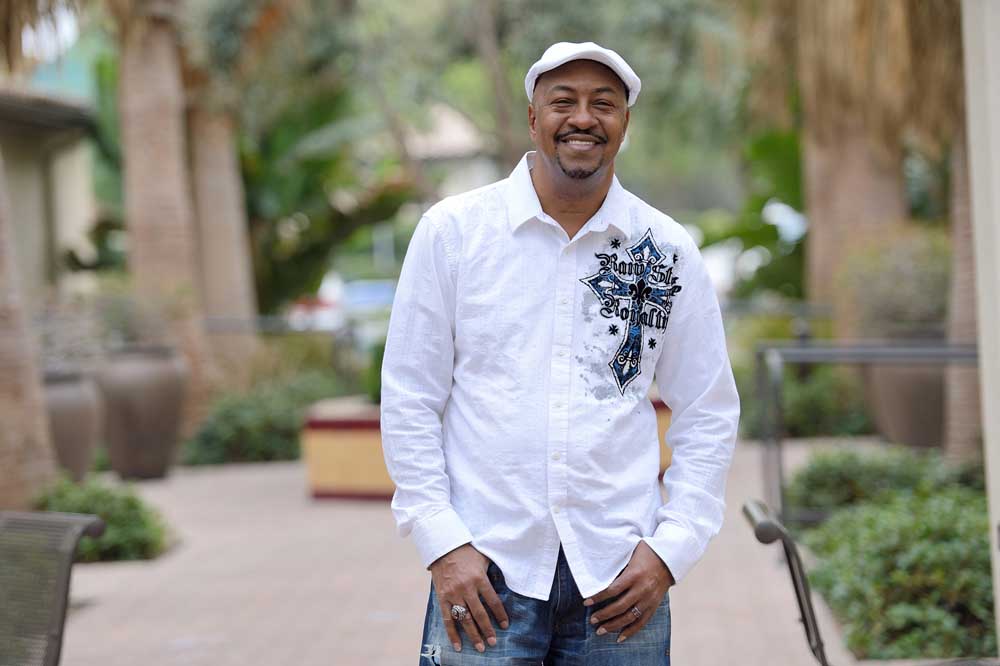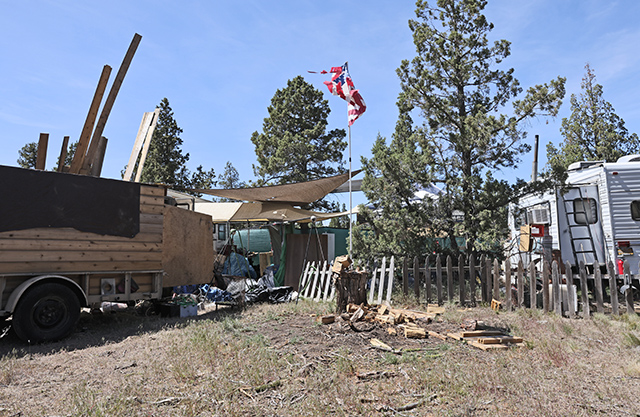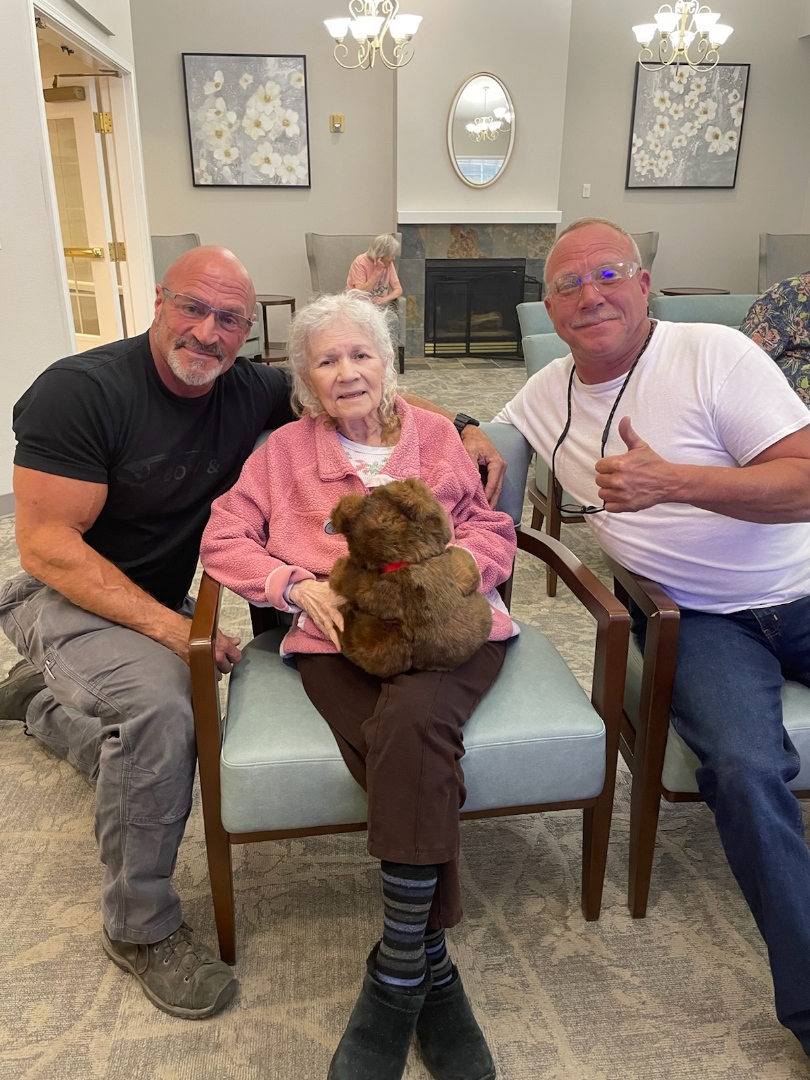Man riddled by gunfire shares tale of forgiveness
Published 12:00 am Saturday, November 19, 2016

- Jeff Gritchen / The Orange County (Calif.) RegisterMinister and gospel singer Tony Davis went to pick up his wife at work in Los Angeles, was shot five times by a gang member and was declared dead at the hospital. Davis woke up 30 minutes after doctors declared him dead. His book “Heaven is Real” talks about what happen during the 30 minutes and his quest to bring love and forgiveness to the world.
IRVINE, Calif. — Tony Davis stopped by a South Los Angeles home to pick up his wife, Chriselda, a health care worker who assisted the mentally ill, on the night of June 30, 2003, when his car was hit by gunfire.
Police officers arrived, took his statements and left. Davis, a devout Christian, recording artist and ordained minister who had moved to Los Angeles from Atlanta with his wife in 1997 to sing rhythm and blues, watched a tow truck approach to take his car to the shop.
Then there was a second hail of bullets. The tow truck driver backed up and sped away.
Blood poured from a bullet wound in Davis’ left leg. He felt more bullets pierce his flesh and lodge into his face and chest.
“Oh my God, enough!” he shouted at the shooter, who stood behind a tree, gun in hand. Davis could see the silhouette of the slightly built teen.
“Stop,” he yelled again. “In the name of Jesus!”
Davis could see the hand that held the gun shake a little and heard these words escape the young man’s mouth: “Oh my God, what have I done?”
Davis collapsed to the ground in a pool of blood. He called his wife and told her he’d been shot. His arms flopped. His eyes closed.
Dead on the operating table
Chriselda Davis heard the gunshots and thought they were fireworks. Then, she got the call from her husband that he’d been shot in front of the house. She ran outside.
“There he was laid out in blood,” she said. “He wasn’t breathing. They did CPR.”
Police found 32 empty shells at the scene around Davis’ body. He had five entry wounds and five exit wounds. Davis lost 40 percent of his blood.
Chriselda Davis was told paramedics got a heartbeat from her husband on the way to the hospital. He immediately was taken into surgery at USC’s trauma center, where he was worked on for seven hours.
“The doctors told me he died on the table,” Chriselda Davis said.
But as a doctor was about to throw a white sheet over Tony Davis’ body, the shooting victim he thought had been dead for 30 minutes took a deep breath and opened his eyes, Davis recounted.
Medical records provided by Davis show he was admitted to Los Angeles County-USC Medical Center, underwent surgery and that he suffered five gunshot wounds.
The Register was not able to contact doctors who attended to Davis at the time. But Humberto Sauri, a trauma surgeon at Orange County Global Medical Center in Santa Ana, says he has never witnessed anything like what Davis is describing.
“Over the course of 16 years, I’ve had a couple of patients who came awfully close to dying and we were able to revive them,” Sauri said. “Usually when you have people come in with a penetrating injury to the chest or heart, once you plug the hole, you could quickly resuscitate them even if their heartbeat is low or if they’re not breathing.”
But, Sauri said he has never heard of a case where a person “comes back” after doctors declare him dead and make no attempt to revive him.
Doctors would declare a person dead if he or she doesn’t have a heartbeat, is not breathing and doesn’t have neurological function, he said.
“You hear these stories,” he said. “But the story is really in the details. How did the doctors at the time look for signs of life?”
Davis tells his understanding of the story: He died, went to heaven and came back to tell the tale.
He said when he fell to the ground, shot, he felt his heartbeat slow and then stop. He said he saw a woman in white, glowing, and heard her tell him it was going to be all right. His spirit saw his body lying in a pool of blood.
And then his ascent to the clouds began.
“I began to feel tremendous love and peace,” he said. “Then, a huge window opened (in the clouds) and I saw this city. I felt so free and whole. It was beautiful. I saw colors I’d never seen before.”
Just as he felt his cares had melted away, Davis said, he heard God speaking to him telling him it wasn’t yet his time. He needed to go back.
“I was distraught,” Davis said. “I did not want to go back and leave all this joy behind.”
He felt himself being pushed back through the clouds and into the operating room. He took a deep breath and opened his eyes. When he came to, he learned that his left leg needed to be amputated above the knee and he would never be able to sing or even talk again because one of his vocal cords had been severed.
“Lord, why did you send me back?” Davis said he asked God.
It was around midnight the day of the scheduled amputation when Davis said he got his answer.
“Forgive,” Davis said God told him. “If you forgive, I will make you whole again.”
“Forgive?” Davis said he thought at the time. “I have this box by the side of my throat and I’m about to have my leg cut off. I’m supposed to forgive?”
But after some internal conflict, Davis said he chose to forgive. Right then, he said, he felt a warm feeling in his left leg, a warmth that progressed all the way to his throat. He fell asleep.
When surgeons arrived to amputate his leg, they were shocked. The leg seems to be alive, they told him. Two days later, he did something else no one at that hospital thought he would do. He uttered his first word after the shooting: “Jesus.”
Power of forgiveness
Davis, 52, lives in Irvine. In the last decade, he has written a book and is shooting a movie about his experience.
He can walk, talk and sing. But now, he only sings Gospel music. He runs a ministry from his home. He serves as staff pastor at the Saints of Value World Ministries church in Downey and as pastor at New Dawn Church in Pasadena.
He tells his story in inner-city schools and in gang intervention programs. That, he says, is his forgiveness in action.
“God spared me because He wanted to spread this message of forgiveness,” he said.
About six months after he woke up on that operating table, Davis said he was “back to normal.”
On Sept. 21, Davis told his story on “The Dr. Oz Show.”
His mentor, Vicki Lee, senior pastor at Saints of Value, encouraged him to share, he said.
“He has helped so many people going through challenges with his testimony,” Lee said. “It is an opportunity he has to tell them that God is God and He is real.”
Koloneus McClarron, 27, of Los Angeles said Davis helped him through a few tough years when he was homeless and struggled to make it as a basketball player.
“I’ve talked to him about how I didn’t want to live anymore,” McClarron said. “He talked me through it and we would pray together. I grew up in a gang-plagued neighborhood in Tacoma and I felt he understood what I came from. His testimony and presence are great for kids who are lost.”
Davis said his own killer didn’t get a chance at redemption. After his recovery, Davis said, he returned to the South Los Angeles neighborhood looking for the young man whose silhouette he had glimpsed during the shooting.
“I learned he had been shot and killed by rival gang members,” he said.
That solidified his resolve to help young people find their way back, Davis said.
“Forgiveness is not just a feeling,” he said. “I couldn’t forgive what happened to me. But I could take this pain and anger that was inside of me and turn it into something positive, loving and good.”






